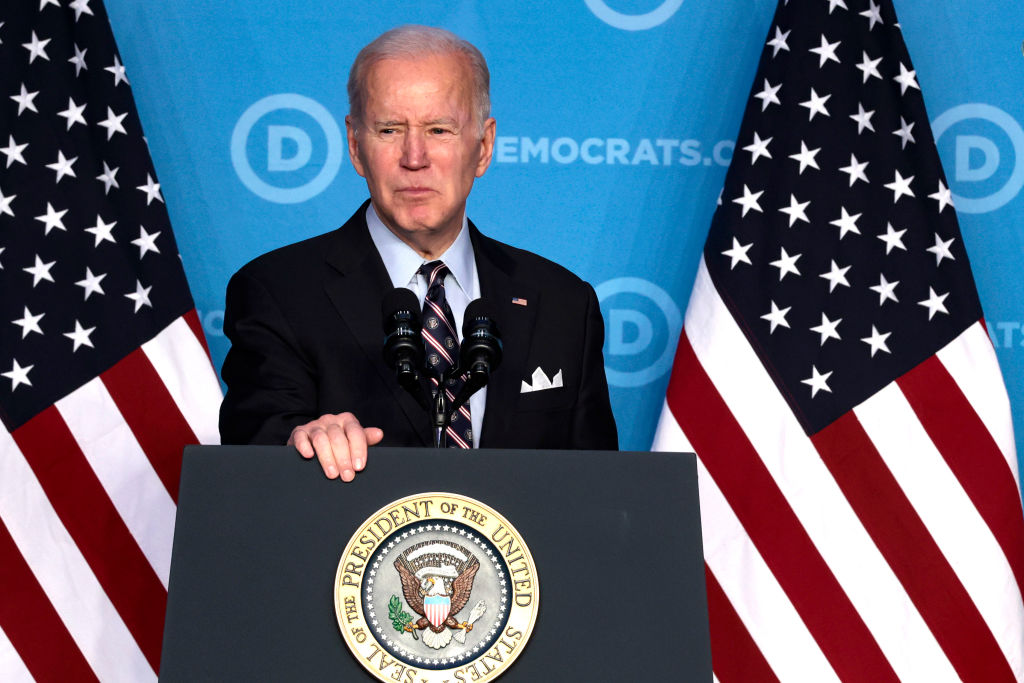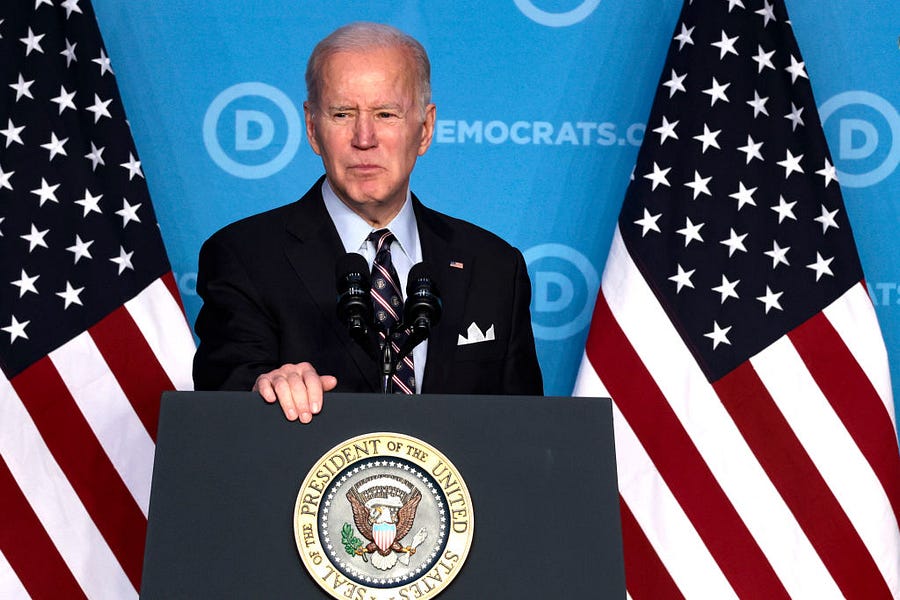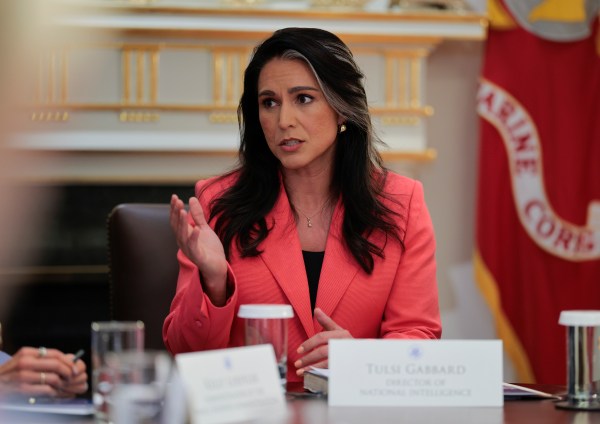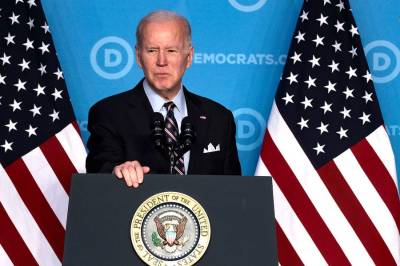Happy Friday! Four Dispatch staffers had to physically restrain Declan to keep him from ripping up today’s newsletter and writing 3,000 words about the Bears’ Khalil Mack trade and how happy he is that there will be a full, 162-game Major League Baseball season this year.
Quick Hits: Today’s Top Stories
The Senate voted 68-31 on Thursday night to pass a $1.5 trillion, 2,700-page spending package that—once signed into law by President Joe Biden—will fund the federal government through September. The omnibus legislation—which includes (about $10 billion worth of) earmarks for the first time since 2011—allocates $13.6 billion in emergency military and humanitarian aid for Ukraine, and boosts defense and nondefense spending over FY 2021 levels by $42 billion and $46 billion, respectively.
The Bureau of Labor Statistics reported Thursday the Consumer Price Index (CPI) increased 0.8 percent in February, and 7.9 percent year-over-year—the fastest annual inflation rate since January 1982.
Pentagon spokesman John Kirby announced Thursday the U.S. government believes North Korea’s two most recent missile tests—on February 26 and March 4, billed as reconnaissance satellite-related—actually involved components of a new intercontinental ballistic missile system the country is developing. “Earlier this week,” he said, “U.S. Indo-Pacific Command ordered intensified surveillance activity in the Yellow Sea, as well as enhanced readiness among our ballistic missile defense forces in the region.”
Several more global corporations—including Disney, Google, Goldman Sachs, JPMorgan, Sony, and Nintendo—announced on Thursday they were suspending or winding down all or most of their operations in Russia in response to the country’s continued aggression in Ukraine. The United Kingdom revealed yesterday it was sanctioning seven additional Russian oligarchs, including Chelsea FC owner Roman Abramovich. Lada, the Russian auto manufacturer, reportedly had to shut down production and place thousands of workers on leave on Wednesday as Western sanctions prevented its parent company from acquiring necessary components and parts.
The Australian government announced plans on Thursday to increase the size of its military 30 percent by 2040. “Our world is becoming increasingly uncertain,” Prime Minister Scott Morrison said, “so it’s important we take steps now to protect our people and our national interest over the coming decades.”
The Transportation Security Administration (TSA) announced Thursday it would extend the federal mask mandate on airplanes, buses, and trains—set to expire on March 18—for another 30 days. “During that time,” it said, “CDC will work with government agencies to help inform a revised policy framework for when, and under what circumstances, masks should be required in the public transportation corridor.”
The U.S. Census Bureau released the results of two analyses on Thursday that found the 2020 Census count on net missed about 782,000 people, a coverage error of -0.24 percent. The Bureau said the United States’ black population was undercounted by 3.3 percent and Hispanic population by 5 percent, while the white population was overcounted by 1.6 percent and the Asian population by 2.6 percent.
Omicron continues to wane in the United States, with the average number of daily confirmed COVID-19 cases falling 53 percent over the past two weeks. Daily COVID-19 deaths—a lagging statistical indicator throughout the pandemic—have decreased about 39 percent over the same time period.
The Labor Department reported Thursday that initial jobless claims increased by 11,000 week-over-week to 227,000 last week.
Buckle Up for More Economic Pain

It’s becoming a bit of a routine at this point. The Bureau of Labor Statistics (BLS) releases its latest Consumer Price Index (CPI) Summary every four weeks or so, and the following morning we write to you about how costs are now rising ___ percent year-over-year, the fastest pace since ____________. This time it’s 7.9 and January 1982, the tail end of Olivia Newton-John’s 10-week run atop the Billboard Hot 100. (“Physical” was quickly supplanted by The J. Geils Band’s “Centerfold”—what was going on back then?)
But Thursday’s report represented more than just the same old same old—it was worse. “The underlying sources of inflation are evolving,” said Jason Furman, Harvard University economist and former chair of President Barack Obama’s Council of Economic Advisers. “Inflation was higher for core services than for durable goods in February—the first month that has been true since high inflation began last spring.”
When costs first started setting off alarm bells last May—4.2 percent annual inflation, how quaint—the phenomenon really could mostly be explained away by a combination of post-pandemic supply chain snags and base effects (measuring against artificially low prices a year earlier). Used cars and trucks, appliances, and energy—industries affected by semiconductor shortages or long ramp-up periods—accounted for almost the entirety of the overall surge.
But that more modest, initial round of inflation was compounded over the past 10 months by additional pandemic stimulus, further supply chain hiccups, an incredibly tight labor market, and ultimately, shifting consumer and business expectations. The price increases have metastasized, setting off a chain reaction throughout the economy that will be difficult to contain.
“Inflation has gotten very broad and gotten a lot of momentum,” Furman told The Dispatch. “Services inflation is more inertial than goods inflation, and more responsive to tight labor markets and labor expectations. Expect it to continue to rise.”
“Services,” in this context, refers to things like housing, healthcare, insurance, education, recreation, and public transportation. Rent, for example, ticked up 0.6 percent from January to February—the biggest month-over-month jump since 1992 (excluding one anomalous month in 1999). On an annual basis, price increases for the entire services category—which accounts for about 60 percent of a person’s CPI “basket”—swelled to their highest level in 31 years.
Looming over all this discussion of services, of course, is the reality that many commodities and goods are now facing additional upward price pressures thanks to the most forceful bout of economic warfare between countries in recent memory. Although the first day or two of the Ukraine-related sanctions and uncertainty were captured in February’s BLS report—it indicated gas prices were up 5.4 percent last month alone—the bulk of those increases won’t show up until next month. That didn’t stop President Biden from pointing a finger at his counterpart in Moscow.
“Today’s inflation report is a reminder that Americans’ budgets are being stretched by price increases and families are starting to feel the impacts of Putin’s price hike,” Biden said yesterday. “A large contributor to inflation this month was an increase in gas and energy prices as markets reacted to Putin’s aggressive actions.” He mentioned Putin’s name two more times in his next few sentences, and various White House officials have begun pushing #PutinPriceHike on social media in recent days.
(A good rule of thumb, Federal Reserve Chairman Jerome Powell told Congress last week, is that every $10 increase in the price of a barrel of oil adds 0.2 percentage points to CPI inflation and subtracts 0.1 percentage point from GDP growth. The price of Brent has jumped from about $94 dollars to $112 over the past month.)
The competing forces at play—runaway inflation on one hand, a likely (but unpredictable) geopolitically caused economic slowdown on the other—puts the Federal Reserve in an exceedingly difficult position as the central bank plans to hold their policy meeting next Wednesday. Powell told lawmakers last week the plan is to forge ahead with a 0.25 percentage point interest rate hike rather than a 0.5 percentage point one, and then remain “nimble” while assessing how the war affects the global economic outlook.
“The Fed is probably going to be using its spyglass to look ahead into the summer months and saying, ‘There’s a decent chance that a slowdown is going to be doing some of the work for us organically,’” John Fagan—cofounder of Markets Policy Partners and former director of the Markets Group at the Treasury Department—told The Dispatch. Higher energy prices, he added, could act as a tax, siphoning some liquidity out of the market and dialing back demand.
But dial back demand too much, and we could be headed for a recession. “I think it’s definitely a bigger risk now,” Fagan said. “Not as acute a risk as it is in Europe, but you look at real wages—those aren’t going in the right direction. The pain at the pump is going to be real. There’s an organic boost that I think is going to come from the end of Omicron—and that’s a counterweight—but overall our expectation is that the drags really increase from here.”
Worth Your Time
Ukrainian President Volodymyr Zelensky’s courage and leadership in the face of Russia’s invasion has been nothing short of inspiring, Peggy Noonan writes in her latest Wall Street Journal column, but that doesn’t mean the West should answer all of his emotional appeals. “To put it crudely, it isn’t bad for [Zelensky’s] purposes if the war escalates, as long as escalation means more allies giving Ukraine what it needs,” she writes, referencing his calls for NATO to establish a no-fly zone. “It would be a blunder to give him what he asks for. A no-fly zone enforced by the U.S. or the North Atlantic Treaty Organization would inevitably entail direct engagement with the Russian military. Since the dawn of the nuclear age the U.S. has carefully avoided direct hostilities with the world’s second-biggest nuclear power. If the war in Ukraine escalated in this way, Mr. Putin could use it to justify the use of terrible weapons, not only nuclear or cyber but also biological or chemical.”
Washington Post reporter David Weigel’s Thursday newsletter looks at the intra-Democratic Party rift that’s been opened up by Putin’s invasion of Ukraine. “A Democratic president barely mentions climate change in the State of the Union. His secretary of energy tells the fossil fuel industry that America needs ‘oil and gas production to rise.’ Democratic governors campaign to suspend the gas tax, which hasn’t been raised in 29 years,” he writes. “This is not where the climate movement, brimming with optimism after Democrats’ 2020 victories, expected to be right now. Activists who’d rallied for a Green New Deal are adjusting and retooling their messaging for a new moment—one where the Biden administration hasn’t delivered on many of its climate pledges, and where environmentalists are being blamed for higher gas prices anyway.”
A Georgia man was recently sentenced to three years in federal prison—and three years of supervised release—for using pandemic relief funds to buy a very expensive Pokémon card. It’s a funny story at first glance, but Reason’s Billy Binion argues it should make Americans think critically about what the criminal justice system is for. “What [Vinath] Oudomsine did [was] thoroughly immoral and plainly dumb,” he writes. “But a three-year stay in federal lock-up (where there is no parole) is absurdly harsh, particularly when considering that he already forfeited the card to law enforcement, that he will have to pay almost $100,000 in restitution and fines, and that the federal government also cannot be trusted to be adequate stewards of the same funds Oudomsine deceitfully pulled from. ‘This was a stupid act for which he should be held accountable, but three years in prison is absolutely overkill,’ Kevin Ring, president of Families Against Mandatory Minimums, tells Reason. ‘A year is a long time. People don’t get that. Three years for this after paying restitution and a fine? It only makes sense in a country like ours where we use prison so frequently, where that is the default punishment… It only makes sense because we’re addicted to it.’”
Presented Without Comment
Also Presented Without Comment
Also Also Presented Without Comment
Toeing the Company Line
Up on the site today, Andrew has a mini-profile of Jennifer Strahan, the Republican newcomer running to unseat Marjorie Taylor Greene in Georgia’s 14th district.
This week’s Stirewaltisms (🔒) is about governors, and why their path to the White House has gotten more perilous. “There is a high premium placed on abstract culture war issues that generate lots of outrage,” Chris writes. “Not only does that play to the strengths of the empty suits in the Senate, it is a dangerous enticement to governors to try to surf the zeitgeist and get some attention out in the hinterland.”
In Thursday’s edition of The Current, Klon Kitchen focuses on what Vladimir Putin’s invasion of Ukraine has likely taught Xi Jinping. “There is a growing chorus arguing that Moscow’s labored invasion will throw cold water on Beijing’s designs for Taipei and may have even bought the estranged island another decade to prepare its defenses,” he writes. “Perhaps. These would certainly be valid conclusions from the invasion of Ukraine. But they are not the only lessons that might be learned.”
Commentary’s John Podhoretz returned to The Remnant on Thursday for some rank punditry on American power, Biden’s presidency, and the awfulness of the ‘70s. Plus: Why are so many brilliant people also extremely bizarre? And what Academy Award nominees are actually worth watching?
On yesterday’s episode of Advisory Opinions, David and Sarah discuss the Supreme Court’s latest voting rights decision before finally turning to Judge Ketanji Brown Jackson’s “most controversial” opinion.
Khaya’s most recent Fact Check debunks the latest propaganda coming out of Moscow that claims the United States is funding a bioweapons lab in Ukraine: “The rumor originated from a misinterpretation of a 2005 agreement between the U.S. and Ukraine.”
Let Us Know
We’ve asked you before, but in light of the latest report: How is inflation tangibly affecting your day-to-day life, if at all? Have you changed any habits or routines to avoid heightened costs?
Reporting by Declan Garvey (@declanpgarvey), Charlotte Lawson (@lawsonreports), and Steve Hayes (@stephenfhayes).







Please note that we at The Dispatch hold ourselves, our work, and our commenters to a higher standard than other places on the internet. We welcome comments that foster genuine debate or discussion—including comments critical of us or our work—but responses that include ad hominem attacks on fellow Dispatch members or are intended to stoke fear and anger may be moderated.
With your membership, you only have the ability to comment on The Morning Dispatch articles. Consider upgrading to join the conversation everywhere.